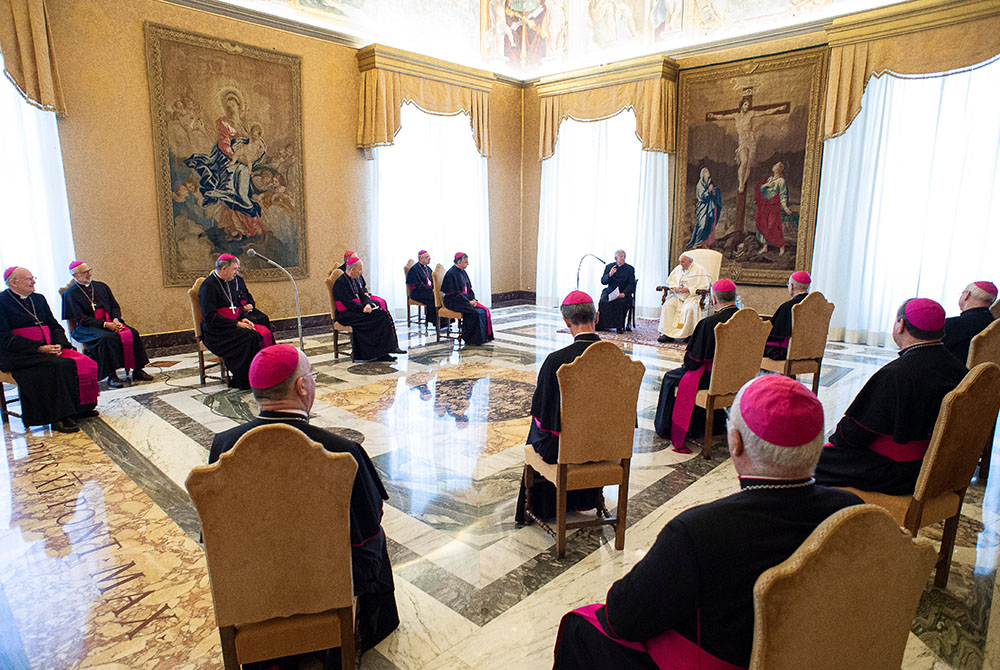
Pope Francis meets with French bishops making their "ad limina" visits at the Vatican March 9, 2020. (CNS/Vatican Media)
The Catholic bishops of France have decided to create an "interdiocesan canonical criminal court" on a national scale.
The project, which was put forward last month during the plenary assembly of the French Episcopal Conference (CEF), is seen as part of the overall response to the crime of the sexual abuse of minors.
"Many people suffer from the slowness of canonical procedures because officialdom is often overwhelmed," said Archbishop Eric de Moulins-Beaufort, the CEF president.
"The creation of a national structure is also motivated by the difficulty of recruiting personnel for the existing offices," he added.
Currently, dealing with marriage annulments constitutes practically 90% of the activity of the ecclesiastical courts in France.
And requests for an annulment have doubled since Pope Francis published his apostolic exhortation Amoris Laetitia in April 2016.
The same tribunal officials that oversee annulment cases also deal with the tiny fraction of other cases related to criminal law in the Church.
But the workload of these officials has increased with the uptick of ecclesial trials for sexual assault offenses.
The historic roots of ecclesiastical justice
The basic principle of ecclesial justice is that "the judge is the bishop." We must go back in time to understand the origins of canon law.
In the Gospel according to Matthew, Jesus suggests fraternal correction for the sinner.
"If he does not listen to you, take one or two others with you so that the entire matter may be settled. If he refuses to listen to them, report it to the community," it says in the Gospel of Matthew (Mt 18, 15-17).
Thus, in the Middle Ages, Christians settled matters among themselves, even to the point of instituting the "privilege of the ecclesiastical forum."
This meant that clerics, at least in France prior to the late 18th century Revolution, were judged only in ecclesiastical courts.
"With the 1983 reforms, the bishop remains the judge; but he usually delegates his exercise of justice to a 'judicial vicar'," explained Bernard Xibaut, the priest-chancellor of the Strasbourg Diocese.
During the French Revolution, priests were subjected to civic justice and not much ecclesiastical justice remained.
The 1983 Code of Canon Law, which was written in light of the reforms coming from the Second Vatican Council (1962-65), opened up positions on Church tribunals to qualified lay people.
"If it weren't for the support of lay people, we wouldn't be able to do our work," noted Hervé Queinnec, the priest who serves as judicial vicar of the ecclesiastical province of Rennes.
"In reality, ecclesiastical justice has few resources," said Anne Bamberg, a professor of canon law at the Catholic University of Strasbourg.
"Ministers of the ecclesiastical court must have at least a licentiate in canon law, which requires extensive study," she pointed out.
Advertisement
The role of clerics in Church tribunals
Because of the lack of qualified personnel, interdiocesan ecclesiastical tribunals were set up in the 1970s.
One of the advantages of this new arrangement was that, in most cases, judges no longer preside over cases that directly involve a confrére from their own diocese.
But that does not mean it is without criticism.
"This justice system is 150 years behind the times," charged Bénédicte Draillard, who worked several years as an investigating judge at the Lyon court.
"There is no place for victims and it is always clerics who judge clerics; it is a bastion of clericalism," she said.
"For the past fifteen years, we have witnessed a resurgence of ecclesiastical justice," added Bernard Xibaut, the diocesan chancellor in Strasbourg.
"Some cases judged by national courts cannot fail to have an impact on the life of the Church," the priest said.
This was the situation recently for Bernard Preynat, the former priest of Lyon who became one of France's most notorious pedophiles.
A correctional court condemned for sexual assault and dismissed from the clerical state, the most serious sentence that can be pronounced by ecclesiastical justice.
Cases sent to Rome
Whatever the sentence, "it is not a matter of condemning, but of sanctioning," said Daniel Bertaud, a canon lawyer in the Archdiocese of Bordeaux.
He said judges in Church tribunals always issue their sentences "with fear and trembling" because "the culprit is still a baptized person; he must be able to find a place in the ecclesial community."
And Pope Francis, who welcomed the ongoing reform of sanctions in Book VI of the Code of Canon Law, pointed out in February 2020 that "canonical punishment always has a pastoral significance."
Although it is up to the local bishop to initiate a canonical investigation, "for sexual assaults on minors or vulnerable persons committed by priests, facts considered delicta graviora, the file must be sent to Rome, to the Congregation for the Doctrine of the Faith," explained the judicial vicar of Rennes, Hervé Queinnec.
Depending on the evidence, the Congregation decides whether or not to prosecute.
It then entrusts the running of the trial to the local bishop, who often delegates the task to a judge.
The new national criminal court that the French bishops hope to set up could fully play this role.
Editor's note: This article originally appeared on La Croix International.




